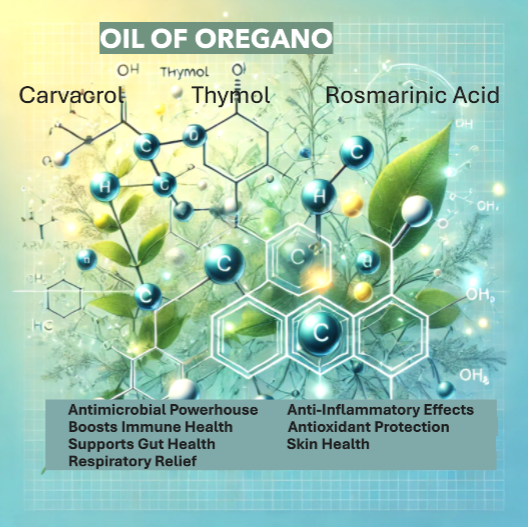
Oil of oregano, derived from the leaves and flowers of the oregano plant (Origanum vulgare), has long been celebrated in traditional medicine for its powerful therapeutic properties. Packed with potent compounds like carvacrol and thymol, the oil of oregano offers a multitude of health benefits, ranging from antimicrobial support to immune system enhancement. Let’s explore its origins, key components, and a wide array of benefits backed by science.

Carvacrol: The primary active compound in the oil of oregano, carvacrol is renowned for its antimicrobial and anti-inflammatory properties. Studies suggest it can effectively combat bacteria, viruses, and fungi.
Thymol: Another powerful compound, thymol acts as a natural antiseptic, supporting immune function and promoting respiratory health.
Rosmarinic Acid: A strong antioxidant found in oregano, rosmarinic acid helps reduce oxidative stress and inflammation.
Oil of oregano is most recognized for its ability to fight harmful microorganisms. Research highlights its efficacy against various pathogens, including:
Rich in antioxidants and immune-supportive compounds, oil of oregano enhances the body’s natural defenses. Its ability to neutralize free radicals protects cells from damage, strengthening the immune response.
By balancing the gut microbiota, the oil of oregano promotes digestive health. Its antimicrobial properties help manage harmful bacteria while preserving beneficial gut flora, aiding in conditions like small intestinal bacterial overgrowth (SIBO).
Thymol in oil of oregano is particularly beneficial for respiratory health. It acts as a natural decongestant, helping to clear airways and reduce symptoms of colds and sinus infections.
Chronic inflammation is a root cause of many health conditions, including arthritis and cardiovascular disease. The anti-inflammatory properties of oregano oil make it a valuable natural aid in managing inflammation.
The high antioxidant content in the oil of oregano combats oxidative stress, reducing the risk of chronic diseases such as cancer and diabetes. Rosmarinic acid plays a crucial role in this protective effect.
Applied topically, diluted oil of oregano can help treat skin conditions like acne, eczema, and fungal infections. Its antimicrobial properties promote faster healing and reduce inflammation.
When selecting an oil of oregano supplement, consider the following:
Source: Choose products made from wild Mediterranean oregano (Origanum vulgare) for maximum potency.
Purity: Opt for oils with at least 70% carvacrol content, ensuring effective results.
Form: Oil of oregano is available in liquid, capsule, and soft gel forms. Choose based on your preference and intended use.
Organic Certification: Look for organic products free from pesticides and synthetic additives.
Oil of oregano is a natural powerhouse with remarkable health benefits. From combating harmful microorganisms to supporting immunity, gut health, and beyond, its uses are as diverse as they are effective. As science continues to uncover the full potential of this ancient remedy, the oil of oregano remains a staple in holistic health practices. Incorporate it into your wellness routine to harness its therapeutic properties and elevate your overall health naturally.
=======================
Recommended Product: